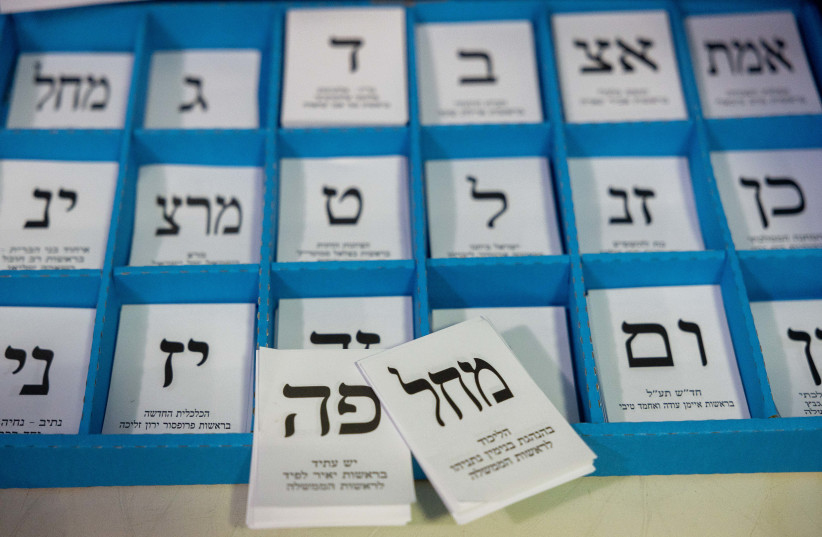It is hard to remember, but it was December 2018 when Israel began the first of the last five rounds of elections. Then, the declared impetus was the IDF draft law, which – not surprising – is still not resolved nearly four years later.
In addition, then-prime minister Benjamin Netanyahu wanted to try and get ahead of the indictment that was on its way to being filed against him. His plan was to first get reelected, then get indicted. That didn’t exactly work, since he failed to form a coalition and Israel went to a second election in September 2019. While the indictment eventually came down, three years later, that trial, too, is still far from being over.
In the four years that have passed since Israel went to the first of these elections, the country has been stuck in a constant corrosive state of mind. It is a natural consequence of an election campaign when people are pitted against each other and politicians are constantly yelling and attacking their rivals, explaining why they and their followers are wrong.
It is relentless – with one side arguing that it is right and why the other side is wrong. Just think about your recent family holiday meals. Politics almost definitely came up at one of the dinners where the anti-Bibi camp made its arguments and the only-Bibi camp made its rebuttals.
It is one thing to have to go through this once every four years. Now imagine you are an Israeli and this has been your environment for four years straight. Four long years.

Sadly, when considering where Israel is headed and how it got here, the chance that this ends is unlikely. The last four years have basically been an endless cycle of division, polarization, arguing for Bibi and against Bibi, for Ra’am in the coalition and against Ra’am in the coalition while – all the time – trying to weed through the fake news and the endless political spin just to understand what is even real.
While the so-called “Change Coalition” established by Yair Lapid and Naftali Bennett can take credit for replacing the prime minister and ousting Netanyahu after 12 consecutive years, in the end their experiment failed. While bringing parties from across the political spectrum together was a nice idea on paper, in practice, it did not work, and the narrow government they formed last June collapsed exactly one year later.
Does that mean that the idea is impossible to repeat? I certainly hope not. Israelis should want to see their government represent the broadest spectrum of society as possible. They should want to have a government that represents the largest and most diverse swath of the public, even if it might come at times with an ideological cost.
But even their biggest success – ousting Netanyahu – did not remove his hold over the country and our political discourse. Even from the opposition, Netanyahu regularly set the national agenda, the tone of debates and constantly had the government on its toes. He might not have been making the decisions, but he was without a doubt influencing them.
When considering what can happen after the election on November 1, the options are not great. On the one hand, there is a possibility that Netanyahu and his bloc will reach 61 or even slightly more. While this bloc has large public support, it will be a government with the potential to change Israel and its democratic character, not for the good.
A government in which the leader is focused on evading trial and top ministers are messianic, anti-Arab, anti-progressive Jews and anti-LGBTQ, anti-women and anti-religious freedom is a government that will not advance Israel.
Many staunch right-wingers know this and are torn. These are people who want to see a right-wing government in Jerusalem, but not one that is going to take Israel backwards in terms of civil liberties, women rights, gay rights, Arab rights and more.
This is why, for example, there are people who are debating between voting for Bezalel Smotrich and Benny Gantz. In normal times that wouldn’t make sense but then again, these are not normal times.
Instability for the people
People don’t know who to vote for and that is how they can one day support Smotrich and the next day move over to Gantz. The fact that the two couldn’t be more ideologically opposed to one another doesn’t mean much in troubled times like these.
Another option is that somehow Lapid succeeds in forming a government. How exactly, remains a mystery with the haredi (ultra-Orthodox) boycott still in place. One idea is relying on the Arab parties but that is unlikely to fly with people like Gideon Sa’ar.
Lapid has a good answer when he is asked how he will form a government. First, he says, he will wait for the final results and then create a plan. Then, he reminds people where he is currently sitting – in the Prime Minister’s Office: “People never thought I’d get here and I did,” he explains, an argument with which it is tough to argue.
And then there is the more likely option – the one people are afraid to speak about now, but know is looming out there – Israel heads to another (sixth) election. This will become the most likely scenario if the right-wing bloc fails to get 61 seats and the haredi boycott of sitting with Lapid remains in place.
While Gantz has aspirations to somehow coerce a premiership on Lapid and the haredim together, the chances of that happening are not great. First and foremost is the fact that we just had a government with a prime minister whose party had a small number of seats. Doing that again is not the best idea.

What does this all mean on a deeper level? That the social corrosion will continue, that the division will carry on and that the polarization in society will only get worse.
Studies have shown the corrosive impact election talk can have on society. One study showed, for example, that when Donald Trump claimed the elections were stolen, peoples’ confidence in elections were undermined.
Another study showed that fake news does not even have to be believed by those who read it to have a negative effect on democratic institutions. Instead, the fear that others will believe the stories is more than enough to cause damage to the democratic process.
This situation is unhealthy for any country, let alone a place like Israel where there is already a tenuous relationship between different sectors in society and the way groups view civil rights and what it means to be a democratic state in which equality is a fundamental principle.
So as you consider how to vote in 12 days, here is one thing to keep in mind: If the November election fails to lead to the establishment of a new government, the next election will take place sometime in April, right around when Israel marks 75th years of statehood.
Haven’t the Jews suffered enough?
